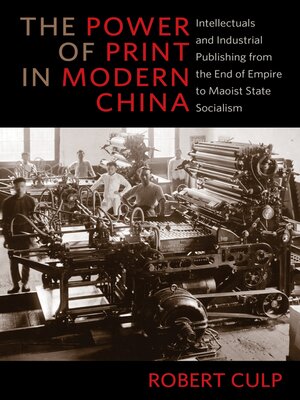The Power of Print in Modern China
ebook ∣ Intellectuals and Industrial Publishing from the End of Empire to Maoist State Socialism · Studies of the Weatherhead East Asian Institute, Columbia University
By Robert Culp

Sign up to save your library
With an OverDrive account, you can save your favorite libraries for at-a-glance information about availability. Find out more about OverDrive accounts.
Find this title in Libby, the library reading app by OverDrive.



Search for a digital library with this title
Title found at these libraries:
| Loading... |
Amid early twentieth-century China's epochal shifts, a vital and prolific commercial publishing industry emerged. Recruiting late Qing literati, foreign-trained academics, and recent graduates of the modernized school system to work as authors and editors, publishers produced textbooks, reference books, book series, and reprints of classical texts in large quantities at a significant profit. Work for major publishers provided a living to many Chinese intellectuals and offered them a platform to transform Chinese cultural life.
In The Power of Print in Modern China, Robert Culp explores the world of commercial publishing to offer a new perspective on modern China's cultural transformations. Culp examines China's largest and most influential publishing companies—Commercial Press, Zhonghua Book Company, and World Book Company—during the late Qing and Republican periods and into the early years of the People's Republic. He reconstructs editors' cultural activities and work lives as a lens onto the role of intellectuals in cultural change. Examining China's distinct modes of industrial publishing, Culp explains the emergence of the modern Chinese intellectual through commercial and industrial processes rather than solely through political revolution and social movements. An original account of Chinese intellectual and cultural history as well as global book history, The Power of Print in Modern China illuminates the production of new forms of knowledge and culture in the twentieth century.






